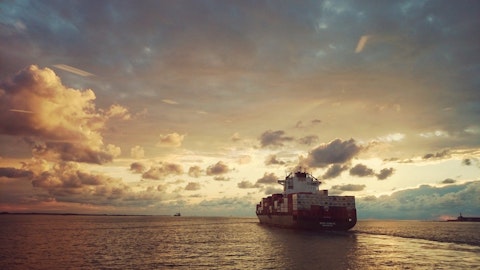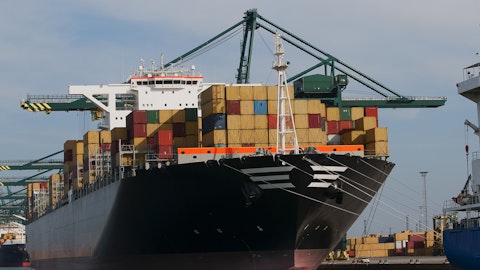Thomas Lister: And quite apart from that, Chris, obviously, as you’ve looked at the economics, the returns even if you take the most conservative assumptions are tremendously attractive. So as Ian said, we’ve put $76 million of debt on these ships, amortizing over a little over 3 years. And during the firm contracted periods, the charters, they’re each — they’re generating over $76 million of EBITDA. So taking contracted cash flows plus the downside recycling value on the asset, you’ve got a tremendously attractive proposition in the first place. And we also think for the reasons that George has mentioned, high reefer plus eco efficiency enhancements to the ships that these ships will have a promising onward employment future, and it’s obviously in that, that drove the original investment.
Christopher Robertson: Okay. Yes, that makes a lot of sense. This is more of a general market question, just in terms of what are you seeing in terms of Chinese manufacturing recovery and exports. I know that the first half of the year here has been characterized more by the service sector improving over there. But just trying to get a sense more around what stage do you think they’re at in terms of the recovery in the manufacturing base.
Thomas Lister: This is Tom, Chris. I’ll have a crack at that. But I would say that to be honest, the lines themselves, the shipping lines are closer to the real flow of cargoes out of China. But I think generally speaking, it seems that the view is that the post-COVID recovery in China has been a little bit lukewarm. So I wouldn’t say there’s a tremendous driver coming from that perspective. And I would also say, and maybe the 2 are linked, that the anticipated restocking that was talked about a lot during the first and second quarters hasn’t yet begun as far as we were aware on the demand side. So again, it comes back to the theme of uncertainty that has sort of run through this earnings call. Guys, I don’t know if anyone else wants to add to that.
Christopher Robertson: Last quick question for me, if you guys don’t mind. Just on the vessel OpEx, do you anticipate any cost pressures for the remainder of the year or any inflationary pressures that are out there that we need to be aware of?
George Youroukos: Well, the main inflation pressure we see, it’s on the wages, salaries of the crew and the officers. That’s something that is creeping up. Lubricant cost has come down because of fuel prices as fuel goes up, lubricant is related. Apart from those 2 and, of course, traveling. As we all know, we all travel, we see that airline tickets are going up and up and up continuously. So these are the 3 — 1 is positive. The other 2 are negative inflationary costs, but we do not see anything that is really material.
Christopher Robertson: All right. Yes. Got it. I’ll turn it over.
Operator: The next question comes from the line of Climent Molins from Value Investor’s Edge.
Climent Molins: Most has already been covered, but I wanted to ask about the upcoming implementation of the European Union emissions trading system. It’s still a bit early. But could this new regulation further exacerbate the premium for eco relative to non-eco tonnage? What kind of impact do you foresee?


